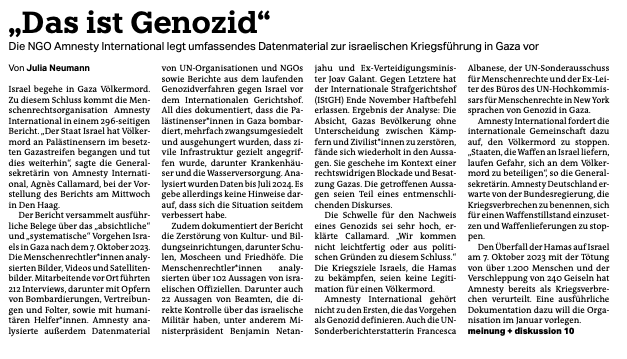

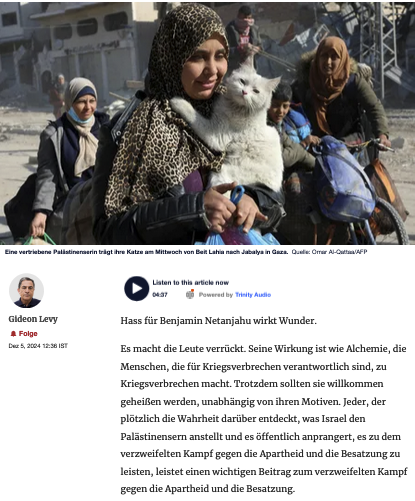

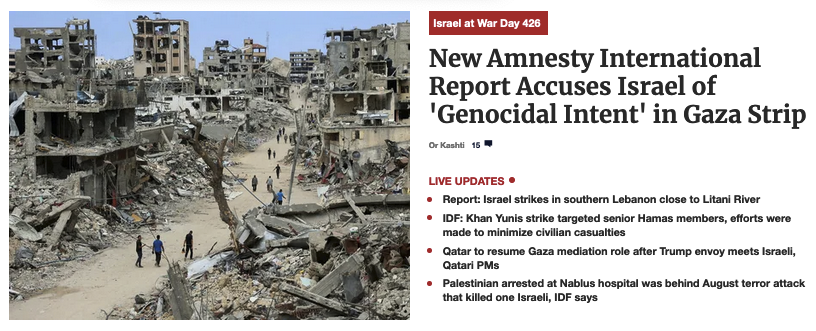
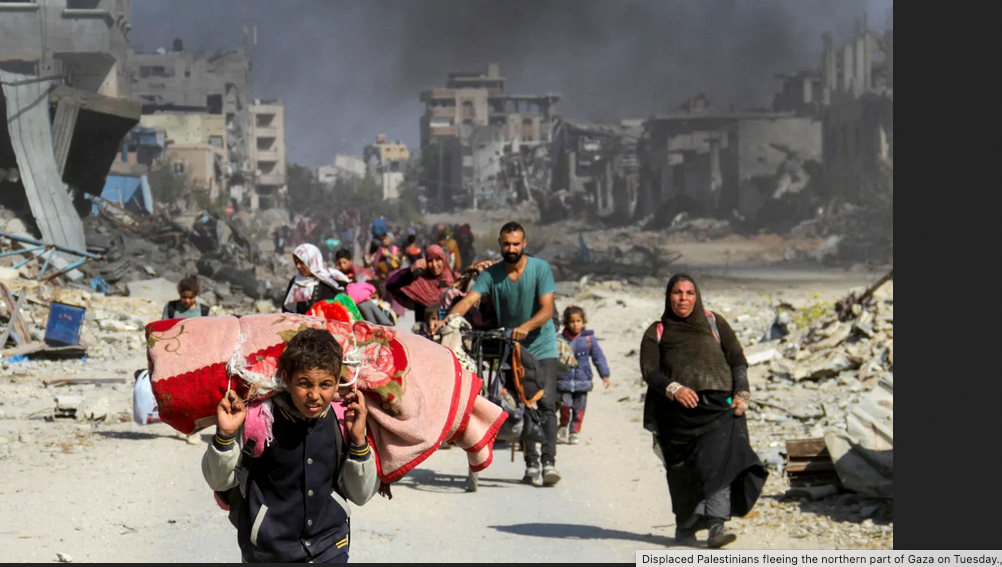
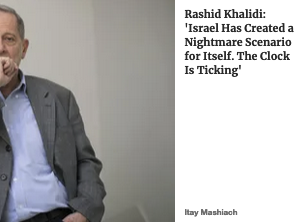

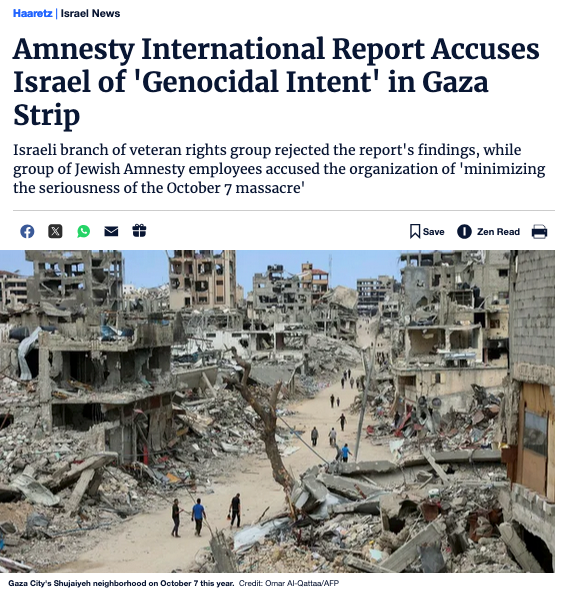
A new report from Amnesty International accuses Israel of committing genocide in the Gaza Strip.
"[We] found sufficient basis to conclude that Israel has committed and is continuing to commit genocide against Palestinians in the occupied Gaza Strip," the report, which was published Wednesday, states.
The organization goes on the claim that "some of the acts investigated by Amnesty International constitute serious violations of international humanitarian law or international human rights law. But in looking at the broader picture of Israel's military campaign and the cumulative impact of its policies and acts, genocidal intent is the only reasonable conclusion."
Unusually, the Israeli branch of Amnesty rejected the international organization's findings, saying that, despite the scope of attacks on civilians in Gaza, it is doubtful that "the element of intent in perpetrating the full or partial extermination of the Palestinians population in the framework of the war" has been proven. A group of Jewish members of Amnesty – in Israel and overseas – was highly critical of the report. "The allegation that Israel is committing genocide in the Gaza Strip is unfounded and the process of writing the report has been flawed," they wrote in a joint statement obtained by Haaretz – and which exposed the differences of opinion within the veteran rights organization.
Agnès Callamard, the secretary general of Amnesty International, wrote that the report "demonstrates that Israel has carried out acts prohibited under the Genocide Convention, with the specific intent to destroy Palestinians in Gaza. Month after month, Israel has treated Palestinians in Gaza as a subhuman group unworthy of human rights and dignity, demonstrating its intent to physically destroy them." She added that the group's "damning findings must serve as a wake-up call to the international community: this is genocide. It must stop now."
The report address the period between October 7, 2023 and the start of July, 2024, and is based on interviews with around 200 Gazans and representatives of the various authorities in the Strip. It also relied on photo analysis and satellite images, as well as statement from senior Israeli officials, in the government and the defense establishment. In the year after the Hamas attack, the report stated, Israel killed more than 42,000 Palestinians, including around 13,300 children, and injured more than 97,000 "many of them in direct or deliberately indiscriminate attacks, often wiping out entire multigenerational families." The war "caused unprecedented destruction, which experts say occurred at a level and speed not seen in any other conflict in the 21st century, levelling entire cities and destroying critical infrastructure, agricultural land and cultural and religious sites. It thereby rendered large swathes of Gaza uninhabitable."
Callamard added "Israel has repeatedly argued that its actions in Gaza are lawful and can be justified by its military goal to eradicate Hamas. But genocidal intent can co-exist alongside military goals and does not need to be Israel's sole intent." She went on to say that "the atrocity crimes committed on 7 October 2023 by Hamas and other armed groups against Israelis and victims of other nationalities, including deliberate mass killings and hostage-taking, can never justify Israel's genocide against Palestinians in Gaza."
Moreover, "the presence of Hamas fighters near or within a densely populated area does not absolve Israel from its obligations to take all feasible precautions to spare civilians and avoid indiscriminate or disproportionate attacks." Later in the report, Callamard says that "regardless of whether Israel sees the destruction of Palestinians as instrumental to destroying Hamas or as an acceptable by-product of this goal, this view of Palestinians as disposable and not worthy of consideration is in itself evidence of genocidal intent."
Among the incidents analyzed in the report were the outcomes of 15 Israeli airstrikes (which were conducted between October 7, 2023 and April 20, 2024), which killed "at least 334 civilians, including 141 children, and wounded hundreds of others. Amnesty International found no evidence that any of these strikes were directed at a military objective." The report adds that these "genocidal" attacks "represent just a fraction of Israel's aerial attacks, they are indicative of a broader pattern of repeated direct attacks on civilians and civilian objects or deliberately indiscriminate attacks."
In response to the report, Amnesty Israel, which operates as a separate NGO from the international body, announced that it does not accept the allegation that Israel is committing genocide, but, at the same time, called for an investigation into "actions that raise suspicion of large-scale and serious violations of international law and crimes against humanity."
According to the majority opinion of Amnesty Israel, despite the scope of "the atrocities committed in the Gaza Strip against civilians, which on the face of it may resemble genocide, the international convention dealing with this crime, and the international law created as a result of it, also requires proof that these crimes were committed with a 'special intent' and specifically to destroy, in whole or in part, the Palestinian population of Gaza. Many of us have doubts about the possibility of proving this intent in an unambiguous manner." However, a small number of Israeli members argued that, "according to the available information, it can be determined that Israel is committing or has committed genocide in Gaza."
Amnesty Israel seems to be wary of criticizing the international organization too harshly. In contrast, a group of Jewish employees, in Israel and in several branches around the world – some of them senior positions – are more explicit in their criticism. In a joint statement, they argued that "the report does not substantiate the allegation that Israel intends to annihilate destroy the Palestinian people." They also argue that report's "artificial analysis" – especially with regard to the widespread destruction in Gaza, which allegedly indicates a genocidal intent – suggests that the authors "reached a predetermined conclusion – and did not draw a conclusion based on an objective review of the facts and the law."
"From the outset, the report was referred to in internal correspondence as the 'genocide report,' even when research was still in its initial stages," the Jewish employees reveal. "This is a strong indication of bias and also a factor that can cause additional bias: imagine how difficult it is for a researcher to work for months on a report titled 'genocide report' and then to have to conclude that it is 'only' about crimes against humanity. Predetermined conclusions of this kind are not typical of other Amnesty International investigations."
The joint statement further stated that the report "is motivated by a desire to support a popular narrative among Amnesty International's target audience," and that it stems "unfortunately, from an atmosphere within Amnesty International of minimizing the seriousness of the October 7 massacre. It is a failure – and sometimes even a refusal – to address the Israeli victims in a personal and humane manner." According to the Jewish staff, the international organization also "ignored efforts to raise these concerns."
"We call on Amnesty International to critically reconsider the working procedures and methodologies that led to the publication of this flawed report. It is imperative to examine the underlying processes, decisions and biases that contributed to this conclusion (…) Protecting human rights must be free from political bias. Only thus can we ensure that the human rights of all people are upheld without compromise."
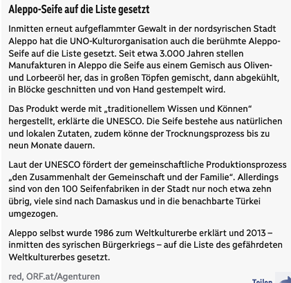
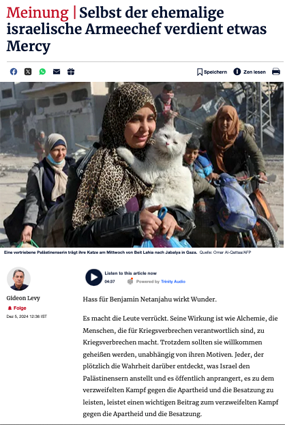
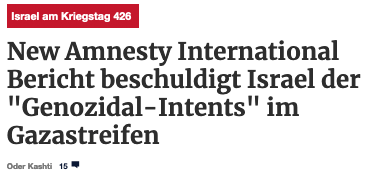
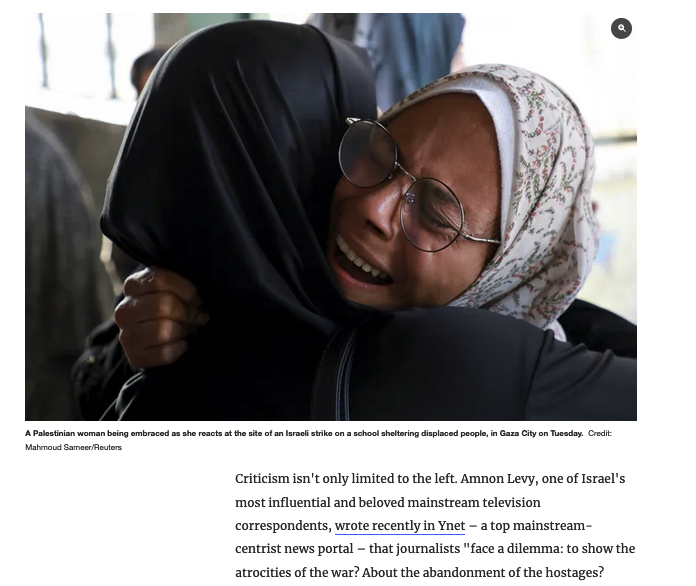
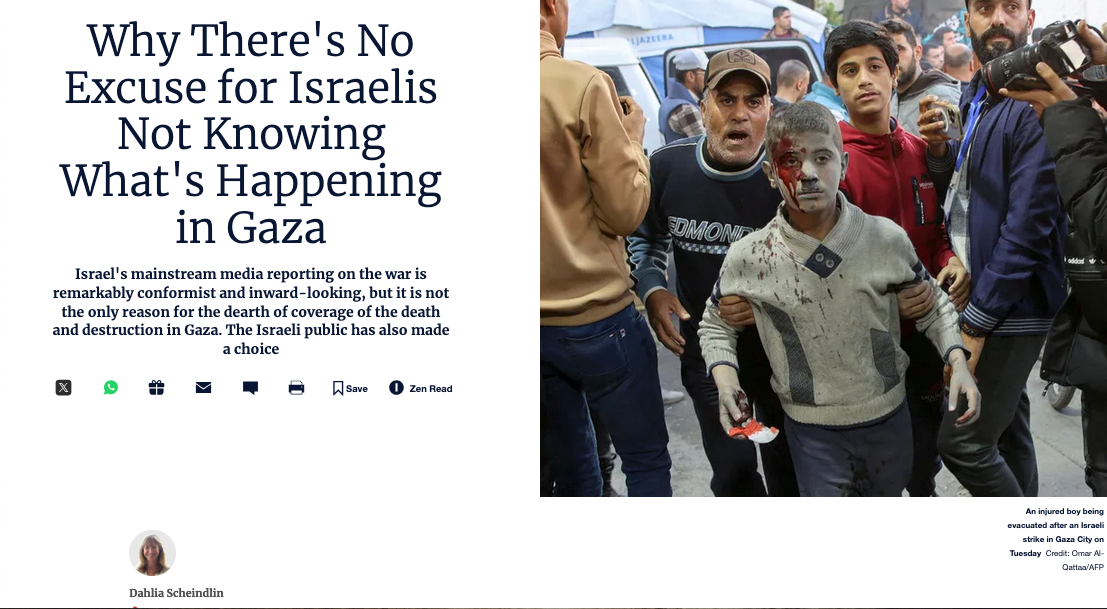


Und dabei.
Weiss der Film sicher nichts von der Penthesilea-Geschichte der R. und des Führers. Wie der Krieg dazwischen kam. Und warum sie als Grossmeisterin des NS-Films für die Leitung der Wochenschauen von alle Fronten dann doch nicht geeignet war.